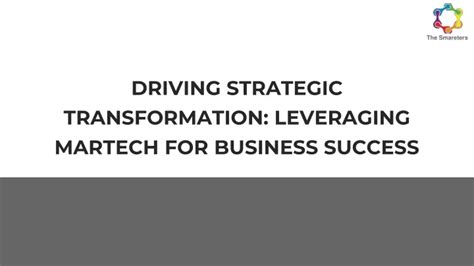In today's fast-paced digital landscape, businesses are constantly seeking innovative ways to stay ahead of the competition and drive growth. One key strategy that has emerged in recent years is the use of marketing technology, or martech. By leveraging martech, businesses can streamline their marketing efforts, improve customer engagement, and ultimately drive revenue growth.
The martech landscape is vast and constantly evolving, with new tools and platforms emerging all the time. However, for businesses looking to get started, it can be overwhelming to know where to begin. In this article, we'll explore seven ways to leverage martech for business growth, from automating marketing tasks to personalizing customer experiences.
Understanding the Martech Landscape
Before we dive into the seven ways to leverage martech, it's essential to understand the martech landscape. Martech refers to the intersection of marketing and technology, encompassing a wide range of tools and platforms that help businesses manage and optimize their marketing efforts.
From social media management and email marketing to customer relationship management (CRM) and data analytics, the martech landscape is vast and complex. According to a report by Scott Brinker, the martech landscape has grown from just 150 solutions in 2011 to over 8,000 solutions in 2022.
1. Automate Marketing Tasks with Martech
One of the most significant benefits of martech is its ability to automate marketing tasks. By automating repetitive tasks, businesses can free up more time to focus on high-level strategy and creativity.
For example, businesses can use martech tools like marketing automation software to automate email marketing campaigns, social media posting, and lead nurturing. This not only saves time but also ensures consistency and accuracy in marketing efforts.

2. Personalize Customer Experiences with Martech
Another key benefit of martech is its ability to personalize customer experiences. By leveraging data and analytics, businesses can gain a deeper understanding of their customers' needs and preferences, and tailor their marketing efforts accordingly.
For example, businesses can use martech tools like customer data platforms (CDPs) to collect and analyze customer data, and then use that data to create personalized marketing campaigns. This can include everything from targeted email marketing to personalized product recommendations.
3. Leverage Data and Analytics with Martech
Data and analytics are critical components of any successful marketing strategy. By leveraging martech tools like data analytics software, businesses can gain a deeper understanding of their marketing efforts and make data-driven decisions.
For example, businesses can use martech tools like Google Analytics to track website traffic, social media engagement, and conversion rates. This data can then be used to optimize marketing efforts and improve return on investment (ROI).

4. Improve Customer Engagement with Martech
Customer engagement is critical to any successful business. By leveraging martech tools like social media management software, businesses can improve customer engagement and build stronger relationships with their customers.
For example, businesses can use martech tools like Hootsuite to schedule social media posts, respond to customer inquiries, and monitor social media analytics. This can help businesses build a stronger social media presence and improve customer engagement.
5. Enhance Customer Insights with Martech
Customer insights are critical to any successful marketing strategy. By leveraging martech tools like customer intelligence software, businesses can gain a deeper understanding of their customers' needs and preferences.
For example, businesses can use martech tools like Salesforce to collect and analyze customer data, and then use that data to create targeted marketing campaigns. This can help businesses improve customer engagement and drive revenue growth.

6. Streamline Marketing Operations with Martech
Marketing operations can be complex and time-consuming. By leveraging martech tools like marketing resource management (MRM) software, businesses can streamline marketing operations and improve efficiency.
For example, businesses can use martech tools like Aprimo to manage marketing workflows, approve marketing content, and track marketing performance. This can help businesses save time and improve marketing ROI.
7. Drive Revenue Growth with Martech
Ultimately, the goal of any marketing strategy is to drive revenue growth. By leveraging martech tools like sales and marketing alignment software, businesses can drive revenue growth and improve return on investment (ROI).
For example, businesses can use martech tools like HubSpot to align sales and marketing efforts, track lead generation, and measure marketing ROI. This can help businesses drive revenue growth and improve marketing performance.

Gallery of Martech for Business Growth






FAQs
What is martech?
+What are the benefits of using martech?
+The benefits of using martech include automating marketing tasks, personalizing customer experiences, leveraging data and analytics, improving customer engagement, enhancing customer insights, streamlining marketing operations, and driving revenue growth.
How can businesses get started with martech?
+Businesses can get started with martech by identifying their marketing goals and objectives, researching and selecting the right martech tools and platforms, and implementing and integrating those tools into their marketing strategy.
In conclusion, martech is a powerful tool for businesses looking to drive growth and improve marketing performance. By automating marketing tasks, personalizing customer experiences, leveraging data and analytics, improving customer engagement, enhancing customer insights, streamlining marketing operations, and driving revenue growth, businesses can achieve their marketing goals and objectives. Whether you're just getting started with martech or looking to optimize your existing marketing strategy, we hope this article has provided valuable insights and inspiration for your business.
